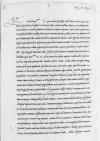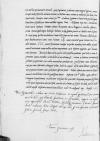List #815
Alfonso de VALDÉS do Ioannes DANTISCUSRegensburg, 1532-08-08
Regest polski: Po tym jak Dantyszek wyjechał, Valdes nie otrzymał od niego żadnego listu. Życzy mu dobrej podróży, i żeby nie zapomniał o tych, którzy za nim tęsknią. Prosi, aby, skoro nie może przyjechać, jak najwięcej pisał. Cesarz wyzdrowiał będąc na wsi i miał zamiar przyjechać do Augsburga, lecz gdy tylko wjechał do miasta, dostał ataku gorączki, więc nie zamierza tam wracać. Valdes ma się dobrze. Jest zagniewany na Dantyszka, że ten, odjeżdżając nie zapoznał go z drugim polskim posłem, ów zaś zwrócił się do niego o pomoc dopiero po długich bezowocnych próbach załatwienia spraw. Valdes pomógł mu natychmiast, jednak sprawa nie przybrała pożądanego obrotu – być może jednak ta zwłoka zaowocuje lepszym rozwiązaniem. Valdes zawiadamia Dantyszka o rezultatach sejmu: wszystkie stany mają stawić się pod rozkazy cesarza na wojnę przeciwko Turcji, wszyscy mają dostarczyć nakazaną liczbę żołnierzy. Najwięcej obiecał książę saski, stawi się także landgraf Hesji. Cesarz obiecał w ciągu sześciu miesięcy uzyskać zwołanie soboru powszechnego, a jeśli papież się na to nie zgodzi – zwołany zostanie następny sejm, który rozstrzygnie sprawy religijne – wcześniej nie należy wprowadzać żadnych zmian. Cesarz szykuje się do wojny z Turcją, część wojska wyruszyła już do Wiednia. Wolne miasta dostarczyły więcej żołnierzy, niż się spodziewano, a prócz tego sprzęt i machiny wojenne. Szwajcarzy oświadczyli Francuzom, iż nie będą walczyć na ich żołdzie, chyba że przeciwko Turkom. Do Niemiec przybyło 8000 żołnierzy hiszpańskich i dwa legiony włoskie, nie licząc ochotników. Papież przysłał nuncjusza a latere kardynała Medici z czterystoma konnymi i z żołdem dla 10 000 Węgrów. Z Hiszpanii przybyli książę Medina Coeli, hrabia Sancti Stephani, przybywają hrabiowie Benewentu, książę Bagiaris, margrabia Asturii, hrabia Monteregale, kuzyn arcybiskupa Toledo i inni liczni arystokraci i szlachta. Spodziewana jest także szlachta francuska. Flota wypłynęła pod dowództwem Andrea Doria. W jej skład wchodzą 42 triremy, 6 karak i 30 mniejszych okrętów, nie licząc pirackich. Na okrętach oprócz załogi do bitwy morskiej znajduje się 10 000 żołnierzy, którzy płyną do Epiru by odeprzeć siły tureckie. Turcy, zorientowawszy się w tych przygotowaniach, ominęli Dunaj i pospieszyli pustoszyć Styrię i okoliczne prowincje. Spowoduje to zmianę planów cesarza. Valdes uważa, że gdyby inni władcy chrześcijańscy dołączyli do tej wyprawy, Chrześcijaństwo zostałoby uwolnione od niebezpieczeństwa. Cesarz jednak spełni swój obowiązek. Po śmierci kardynała Colonna cesarz powołał na wicekróla Neapolu markiza de Villafranca [Pedro de Toledo], który udał się natychmiast do Neapolu. Valdes przesyła Dantyszkowi rękawiczki z gatunku tych, które nosi cesarzowa, aby mógł zjednać sobie przychylność jakiejś dziewczyny hiszpańskim prezentem. Valdes przekazuje prośbę Granvelli, który chciałby kupić w Polsce dobrego konia pod wierzch.
| odebrano Cracow (Kraków), 1532-08-20 Rękopiśmienne podstawy źródłowe:
Publikacje:
| ||||||||||||||||||||||||||||||||||||
Tekst + aparat krytyczny + komentarz Zwykły tekst Tekst + komentarz Tekst + aparat krytyczny
Reverendissimo Domino, domino
Reverendissime Domine observandissime.
Ex quo a nobis discessisti, nihil litterarum abs te accepi. Iter tuum tibi feliciter successisse vehementer cupio, sed ita, ut isthaec felicitas te in oblivionem nostri non inducat. Vix credas, quanto tui desiderio tui omnes teneamur. A quo, si non expedit, ut tua nos praesentia liberes, praesta saltem, quod minimo incommodo praestare poteris, ut frequenter ad nos de rebus tuis scribas. Nullae enim litterae excipientur hic alacrius, nullae legentur avidius, quam tuae.
Quae hic agamus, paucis praescribam.
Quod ad religionem autem spectat,
Chirothecas ex his, quas
Vale.
Postscript:
Dominus
Iterum vale.
Tuus, quantus est,


